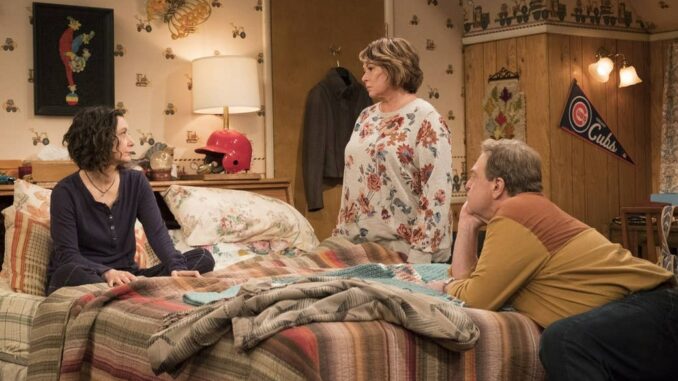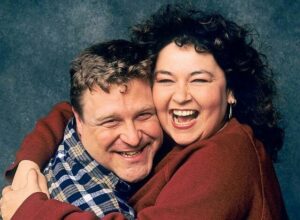
The finale of the controversially rebooted sitcom brought to an end a season of problematic storylines, familial strife and a star whose off-screen politics threatened to derail it all
There’s a moving scene in the season finale of the Roseanne revival where Dan is desperately trying to save sentimental items from his rapidly flooding basement. At first he seems to have a handle on things, but when he places a large box on a shelf, it suddenly collapses, and boxes and toys and mementos come crashing down into the water. Dan smiles, bewildered and exhausted by his bad luck, and then proceeds to take a crowbar and angrily destroy the wall next to him, half laughing and crying as he does it.
Roseanne
Is it possible to separate Roseanne from its controversial star?

There is a desperation to this scene that I think defines the entire first season of the series, which strives to tell the story of ordinary working-class people who just can’t seem to catch a break. Despite the attention the series has received for touching on “hot-button” issues, the show is ultimately about disappointment and loss. Roseanne jokes that “at least we finally got a swimming pool after all these years”, but her humor is cold comfort for an American dream that has all but dried up. When Dan’s best friend Chuck comes over to confront him about hiring cheaper labor for one of his projects, Dan is both ashamed and resolute that he had no other option, “I always told you, if I’m eating, you’re eating. I’m not eating,” Dan tells him sadly.
In this way, the Roseanne revival isn’t just a portrait of middle America, but a portrait of middle America in profound crisis. True, the Conners have had to weather tough times before, but the new season is especially bleak, with each character having to contend with their own personal regrets at a time when options seem to be running out. Becky finds out her eggs are too old and she will never be able to have a baby. Darlene is forced to move back in with her parents and two kids when she loses her job. Roseanne is popping pain pills out of desperation, since she can’t afford knee surgery.
The show’s exploration of these economic issues is often subtler and more nuanced than the series is given credit for. John Goodman is particularly moving as Dan, a devoted father and husband who is trying to make the best choices for his family, and Sara Gilbert’s performance as Darlene is a compelling exploration of what happens when real life gets in the way of our dreams. It’s not just poverty that is a roadblock to happiness either – one of the series’ triumphs is being able to depict to loving allure of family life, while also illustrating its profound frustrations, from daily squabbles over household chores, to the way that intimacy is often conveyed through mean little jabs at one another’s expense, rather than little “I love yous”.
Roseanne Barr, Jayden Rey, Sara Gilbert and Laurie Metcalf in

Roseanne’s meanness has always been an aspect of her character, yet her willingness to say the unsayable has taken on new meaning in a culture that has grown crueler over the past 20 years. While the reboot consistently handles economic issues with sensitivity, it is also often remarkably insensitive when it came to race. Roseanne assumes that the Muslim neighbors next door are terrorists, and both she and Dan malign Mexican workers as “illegals”. When Dan and Roseanne sleep through the “black and Asian” shows, Roseanne quips that they didn’t miss much, noting how they are, “just like us”. Moments like these are meant to be edgy rather than overtly racist, but as much as the series tries to tie economic anxieties to racial tensions, it’s clear that Roseanne’s fears and frustrations around non-white families are portrayed as being “natural”, rather than sinister.
“Roseanne Gets the Chair” – Roseanne’s clash with Darlene over how she’s raising her kids – especially Harris – reaches a breaking point; while Dan tries to help Roseanne with her bad knee by getting her an elevator chair, which she refuses to use because she doesn’t want to admit getting old, on the second episode of the revival of “Roseanne,” TUESDAY, APRIL 3 (8:00-8:30 p.m. EDT), on The ABC Television Network. (Adam Rose via Getty Images) SARA GILBERT, ROSEANNE BARR, JOHN GOODMAN
Modern family: how Roseanne deals with the political divide at home
Likewise, there is a moment in this season when Roseanne quite literally holds her teenage granddaughter by the neck and pours water on her head as a kind of punishment for talking back, which is held up as an effective parenting technique, rather than a huge overstep that is borderline abusive. On Twitter, the real-life Roseanne touted her role in this episode by writing: “The next
